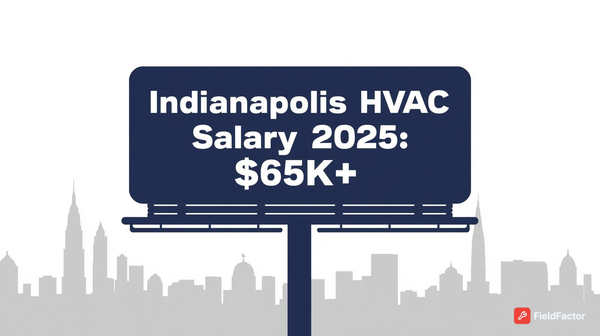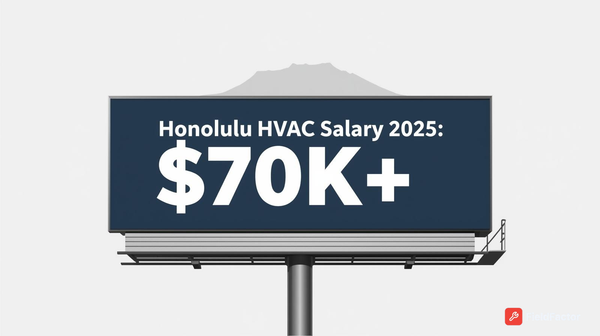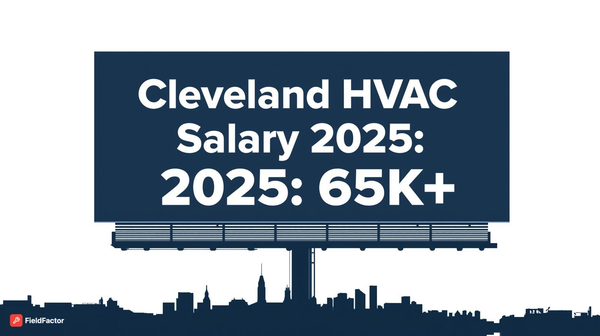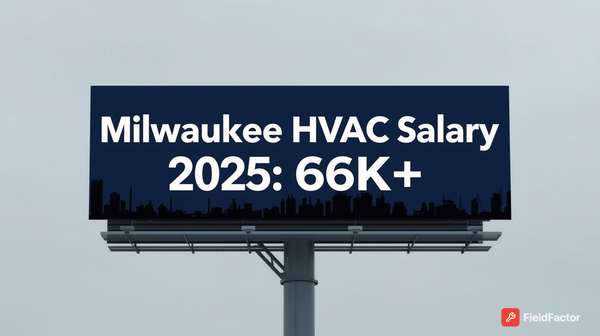The Truth About Private Equity HVAC Deals: What Owners Really Get Paid
Private equity has poured $15B into HVAC companies—but what are owners really getting paid? Discover real multiples, hidden trade-offs, and how to protect your legacy in 2025’s hottest acquisition wave.

Private equity firms have poured over $15 billion into HVAC companies in the past five years. If you own an HVAC business, this trend will affect you—whether you're selling or staying independent.
Here's what's really happening, what it means for your business, and how to respond strategically.
Why Private Equity Can't Stop Buying HVAC Companies
Four factors make HVAC businesses irresistible to financial investors:
Predictable recurring revenue. Maintenance contracts and service agreements create monthly cash flow that investors can model and value confidently.
Market fragmentation. There are over 116,000 HVAC businesses in the United States. Most generate under $5 million annually. This fragmentation creates acquisition opportunities at scale.
Defensible labor advantage. You can't offshore HVAC work or replace experienced technicians with automation. Companies with strong technical teams have real competitive moats.
Pricing power. When material costs rise, HVAC businesses can typically pass those increases to customers—especially for emergency repairs and equipment replacements.
The Private Equity Playbook: What Happens After Acquisition
The Rollup Strategy
PE firms don't buy one company and stop. They acquire 5-20 local businesses across different markets, consolidate operations, and build regional platforms.
Recent examples include:
- Clockwork Home Services (backed by Gryphon Investors)
- One Hour Heating & Air Conditioning (part of Authority Brands)
- AIRCO (expanding across Texas and the Southeast)
Immediate Operational Changes
Expect these transformations within the first 90 days:
New technology becomes mandatory—typically ServiceTitan, Housecall Pro, or similar field service management platforms.
Call centers replace individual office staff to handle scheduling, dispatch, and customer service at scale.
Performance dashboards track every technician's revenue per hour, conversion rates, and average ticket size.
Marketing spend increases dramatically, often reaching 5-10% of revenue compared to 2-3% for most independents.
The Exit Timeline
Private equity firms operate on 3-7 year investment horizons. Every operational decision is designed to maximize valuation at exit, when they'll either:
- Sell to a larger private equity firm at a higher multiple
- Take the consolidated platform public
- Sell to a strategic buyer like a national franchise network
The Financial Upside: What Owners Actually Receive
Current Valuation Multiples
Quality HVAC businesses are selling for multiples that seemed impossible five years ago:
| Annual Revenue | Typical EBITDA Multiple | Example Sale Price* |
|---|---|---|
| $2-3M | 5-7x | $2M-4.2M |
| $3-5M | 6-8x | $3.6M-8M |
| $5-10M | 7-10x | $7M-20M |
| $10M+ | 10-15x | $20M-45M |
*Assumes 20% EBITDA margins
If your company nets $1.5 million annually, you're looking at a $9-15 million exit opportunity. For most founders in their 50s and 60s, that's generational wealth.
Beyond the Purchase Price
PE firms bring resources most owners can't access independently:
Growth capital for hiring, fleet expansion, and new territory development without debt constraints.
Operational systems including proven hiring processes, tested marketing playbooks, and sophisticated financial reporting.
Leadership development through coaching and access to executives who've scaled similar businesses.
The Real Costs: What You're Giving Up
Cultural Transformation
This is the most common post-acquisition regret. Your family-oriented, craftsmanship-focused culture often gets replaced with:
- Mandatory sales scripts and upselling requirements
- Pressure to hit aggressive conversion metrics
- Corporate processes that frustrate long-tenured technicians
One former owner described it plainly: "My guys went from proud craftsmen to numbers on a spreadsheet."
Loss of Autonomy
Even if you stay on post-acquisition (most deals require 2-3 years of continued involvement), you're no longer making final decisions. You'll report to:
- A board of directors focused on quarterly performance
- An operating partner who may not understand your local market dynamics
- Financial analysts who prioritize EBITDA over customer satisfaction
Short-Term Optimization
PE firms optimize for their exit timeline, not your legacy. This can mean:
- Cost cuts that compromise service quality
- Aggressive pricing that damages customer relationships
- Workload increases that burn out your best people
How Independent Shops Can Compete
If you're staying independent, here's how to compete against PE-backed competitors with deeper pockets:
Match Their Technology, Not Their Budget
You don't need $500K in software. You need the same capabilities:
Field service management: ServiceTitan, Housecall Pro, or FieldEdge for dispatch and customer management.
Communication automation: Podium or Broadly for review generation and customer messaging.
Financial visibility: QuickBooks or Xero with proper job costing and real-time reporting.
The technology isn't expensive. The discipline to use it consistently is what separates winners from losers.
Win on Relationships, Not Scale
PE-backed competitors have more trucks. You have something they can't replicate:
Local reputation and trust built over decades, not quarters.
Owner accessibility for VIP customers who want direct communication.
Flexibility to solve unique problems their standardized playbooks can't handle.
Community presence through sponsorships, coaching, and neighborhood involvement.
Protect Your Team Aggressively
PE-backed firms are offering signing bonuses, equity programs, and corporate benefits. You need a retention strategy:
Profit-sharing that gives technicians ownership mentality and upside.
Work-life balance that PE-backed competitors can't match due to their growth targets.
Clear advancement paths to partnership or equity ownership.
Culture preservation that makes people proud to work for you.
Build Recurring Revenue
Maintenance contracts are what PE firms value most. If you're light on recurring revenue:
- Create tiered maintenance plans (basic, premium, VIP)
- Price them for 20%+ gross margins
- Get 30-40% of customers enrolled within 24 months
- This makes your business more defensible and more valuable
Should You Consider Selling?
The Right Questions to Ask
Are you ready to exit? If you're under 50 and still energized by the business, you might regret selling. If you're burned out or planning retirement within 5 years, timing may be ideal.
Does your business qualify? PE firms want companies with $2M+ revenue (preferably $5M+), EBITDA margins above 20%, documented processes, and clean financials.
Can you handle the cultural shift? If your identity is deeply tied to your company's reputation and customer relationships, watching it transform post-acquisition will be painful.
What happens to your people? Your best technicians might leave after the acquisition. Your office staff might not fit the new corporate structure. Have honest conversations before signing.
Decision Framework
| Question | Answer | Next Step |
|---|---|---|
| Ready to exit? | No | Focus on competing independently |
| Yes → | Continue | |
| Business worth $2M+? | No | Build value for 2-3 years first |
| Yes → | Continue | |
| Can handle culture change? | No | Consider alternatives (employee ownership, strategic buyer) |
| Yes → | Continue | |
| Team protected in deal terms? | No | Negotiate retention bonuses and earn-outs |
| Yes → | Seriously evaluate offers |
What's Coming in 2025-2027
Mega-Consolidation Accelerates
The era of small acquisitions is ending. Expect platform-on-platform deals where large PE-backed HVAC companies acquire other PE-backed companies for $500M+.
Your local competitor could suddenly gain access to unlimited capital if they become an add-on acquisition to a regional platform.
The War for Technician Talent Intensifies
Labor shortages will drive:
- 15-25% wage increases for experienced techs in competitive markets
- Signing bonuses of $5,000-15,000 becoming standard
- Corporate benefits packages (401k matching, health insurance, paid training)
- Equity programs offering technicians ownership stakes
If you're staying independent, culture and work-life balance become your primary competitive advantages for talent.
Technology Gaps Widen
PE-backed firms are deploying AI dispatch systems, automated follow-up, predictive lead scoring, and dynamic pricing algorithms.
The good news: Most of these tools are now affordable for independents. The challenge is implementation discipline.
The Independent Shop Becomes Rare
Industry analysts predict 40-50% of total HVAC revenue will be controlled by PE-backed companies by 2030. Major metropolitan markets will be dominated by 3-5 large players instead of dozens of small shops.
Your Strategic Window: The Next 18 Months
If you're considering selling, now through mid-2026 represents peak timing:
- Valuations remain high (6-10x EBITDA for quality businesses)
- PE firms are actively seeking add-on acquisitions
- Your business hasn't yet been competitively damaged by mega-platforms
- Interest rates may decline, increasing deal activity
If you're staying independent, the next 18 months are critical:
- Lock in your best technicians with retention packages
- Adopt the technology PE-backed firms use
- Double down on community relationships and local reputation
- Build recurring revenue through maintenance contracts
The middle ground is disappearing. You're either getting bigger or getting better—choose your path strategically, not reactively.
Final Thoughts
Private equity involvement in HVAC isn't inherently good or bad. It's simply a different business model with different incentives and timelines.
If you're considering a sale, get multiple offers, hire an M&A advisor who understands home services, and negotiate terms that protect your team and your legacy beyond just the purchase price.
If you're staying independent, you can absolutely compete—but you need to match their operational sophistication without losing what made you successful: relationships, reputation, and customer trust.
The HVAC industry is transforming faster than most owners realize. The winners will be those who see what's coming and respond strategically before they're forced to react.
Frequently Asked Questions
How much is my HVAC business worth?
Most HVAC companies sell for 6-10x EBITDA. A business netting $1 million annually typically sells for $6-10 million, depending on recurring revenue percentage, market position, and growth trajectory.
What do private equity firms look for in HVAC acquisitions?
They want businesses with $2M+ revenue, EBITDA margins above 20%, recurring maintenance contracts, clean financial records, and an owner willing to stay on for 2-3 years post-sale to ensure continuity.
Can I stay independent and still compete effectively?
Yes. Focus on superior service quality, local relationships, and adopt the same technology PE-backed firms use. Many customers actively prefer working with owner-operated businesses if the professionalism level is comparable.
What typically happens to employees after a PE acquisition?
Results vary significantly. Some PE firms invest in training and increase compensation. Others cut costs and increase performance pressure. Top performers often receive retention bonuses. Employees who don't adapt to the new culture frequently leave within 12-18 months.





